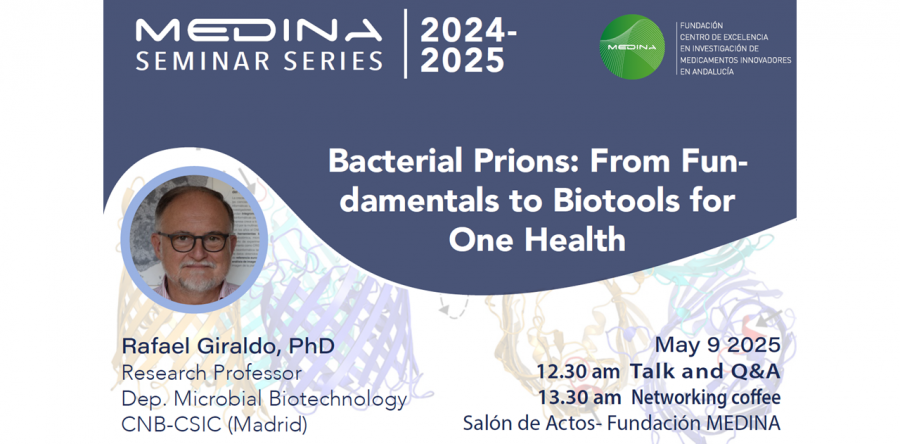MEDINA Invited Seminar Series – Dr. Rafael Giraldo
Granada, April 9, 2025
We are happy to announce that the next seminar in the MEDINA Seminar Series, will host Dr. Rafael Giraldo. Since 2010, he has been a Research Professor at the National Center for Biotechnology – CSIC and a member of Academia Europaea. Additionally, he is the President of the Spanish Society for Microbiology (SEM). Dr. Rafael Giraldo will give a talk titled “Bacterial Prions: From fundamentals to biotools for One Health.”
The seminar will take place on May 9th at 12:30 pm in the Auditorium of Fundación MEDINA, Fundación PTS, Granada.
Don’t miss the opportunity to interact with Dr. Giraldo and discover firsthand the advances he is developing in bacterial models as tools for studying prion diseases. Additionally, you will be able to connect with colleagues from the scientific community of Granada and its surroundings to exchange innovative ideas and open the door to future collaborations. We look forward to seeing you there!
If you cannot attend in person, there is the possibility to connect to the seminar via Zoom (registration required).
Abstract: Prions are proteins with at least two alternative conformations, one of them soluble while the other is a self-templated amyloid aggregate, which is vertically (epigenetically) propagated with cell division and, in some cases, also horizontally transmissible between cells (infectious). In prion proteins, the native and the amyloid conformations have either distinctive functions or the amyloid loses function gaining cytotoxicity. Increasingly found in organisms across the whole Tree of Life, prions arguably are among the most fascinating biological entities by being involved in adaptative response to environmental challenges or in triggering neurodegenerative and systemic amyloid diseases.
Starting from the seminal finding that the WH1 domain in a bacterial protein (RepA) builds functional amyloids to negatively control plasmid replication, we have implemented their use in Synthetic Biology applications including nanosensors for amyloid aggregation and a biosafe minimal model of an intracellular generic amyloid disease, which provides insight on the principles of prion propagation.
We are currently engaged in: A) Exploring the prion-like behaviour of WH1 domains in Rep proteins from plasmids of the prevalent phytopathogen Xylella fastidiosa, paving the way to their possible use in the containment of pathogenic bacteria. B) Engineering an outer membrane porin (OmpF) that enables bacteria to capture and degrade disease-relevant extracellular amyloids present in gut microbiota, which are potential triggers for neurodegeneration, or infectious prions persistent in natural environments such as soils.
– Giraldo R (2020) mSystems 5: e00553-20.
– Vendrell-Fernández S, et al. (2022) ACS Synth. Biol. 11: 655-667.
– Giraldo R (2024) PLoS Pathog. 20: e1012253.






